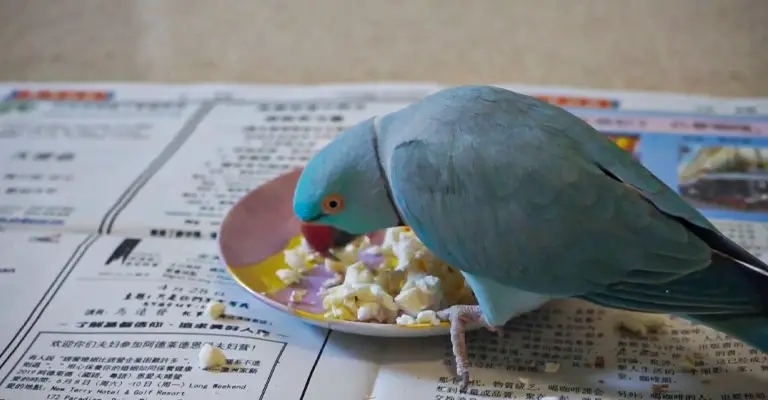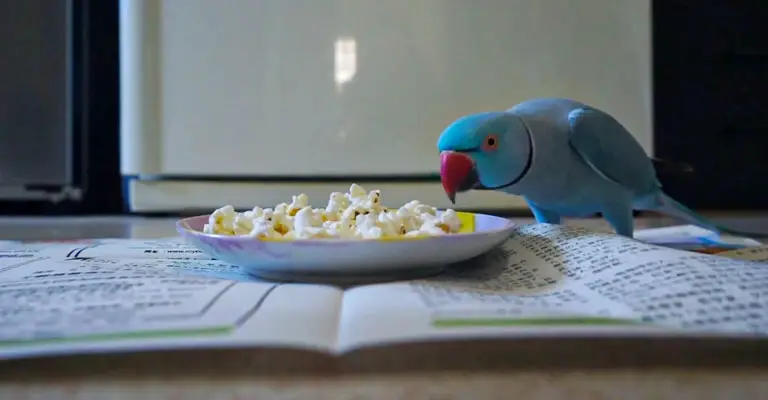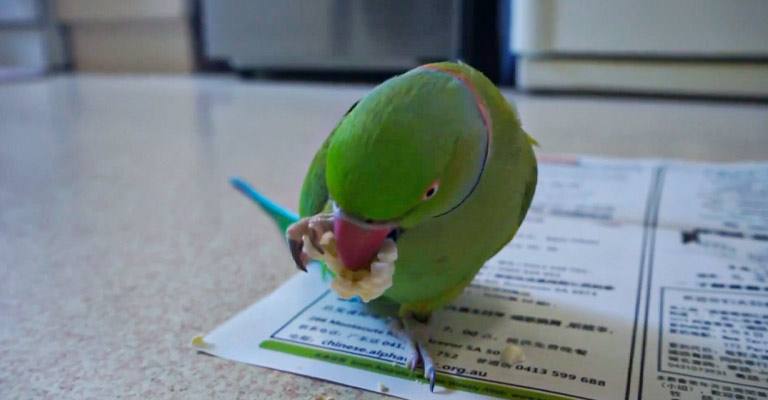Birdwatching and feeding our avian friends can be a delightful and educational pastime. However, when it comes to offering treats like popcorn, it’s crucial to consider their dietary needs and safety.
In this blog post, we’ll explore the world of popcorn as bird food, answering the questions of whether birds can eat cooked or uncooked popcorn and what’s the best approach for their well-being.
Bird enthusiasts often find themselves wondering about the suitability of popcorn, given its popularity as a human snack. Is it a nutritious option or simply a source of entertainment for our feathered companions? So, stay focused.

Can Birds Eat Popcorn?
Birds can eat plain, unsalted, and unbuttered popcorn in moderation. However, it’s important to offer popcorn as an occasional treat rather than a primary food source for birds. Popcorn should be given in small quantities as it lacks essential nutrients that birds need for a balanced diet.
Ensure the popcorn is not seasoned with salt, butter, or any artificial flavorings, as these can be harmful to birds. Plain air-popped popcorn is the safest option. To make it easier for birds to eat, you can break it into smaller pieces.
Remember that while popcorn may be an occasional snack, it should not replace a bird’s regular diet of seeds, fruits, insects, and other natural foods.
Providing a variety of bird-friendly foods is essential for their health and well-being. Always offer fresh water alongside any treats you provide for your feathered friends.
Cooked vs. Uncooked Popcorn for Bird
Uncooked popcorn is a safer option to offer to birds compared to cooked popcorn. Here’s why:
No Added Ingredients
Uncooked popcorn is free from any additives like salt, butter, or artificial flavorings, which can be harmful to birds. These additives can disrupt a bird’s natural dietary requirements.
Less Processing
Cooking popcorn involves heat, which can alter the popcorn’s texture and composition. Uncooked popcorn retains its natural state and is less likely to pose any digestive issues for birds.
Less Risk of Burning
If popcorn is overcooked or burnt, it may produce smoke and a burnt odor, which can deter birds from eating it.
Preservation of Nutrients
Uncooked popcorn retains its original nutritional value, although it should still be considered a treat rather than a primary food source for birds.
Remember to break the uncooked popcorn into smaller, manageable pieces for birds, making it easier for them to eat.
How to Feed Popcorn to Birds?
Feeding popcorn to birds can be an enjoyable way to observe and attract them to your yard. Here’s a simple guide on how to do it safely:
Choose Plain, Unsalted, and Unbuttered Popcorn

Opt for plain, air-popped popcorn without any additives. Avoid popcorn with salt, butter, or artificial flavorings, as these can be harmful to birds.
Break It into Smaller Pieces
Birds have small beaks, so break the popcorn into smaller, bite-sized pieces. This makes it easier for them to eat.
Offer in Moderation
Popcorn should be considered an occasional treat, not a staple food for birds. It lacks essential nutrients, so it’s important to supplement their diet with a variety of natural foods like seeds, fruits, insects, and nuts.
Place It in a Feeder
You can scatter the popcorn on a clean, dry surface or use a bird feeder to keep it off the ground and away from potential contaminants. A platform feeder or a hopper-style feeder with a tray works well.
Keep It Dry
Wet or damp popcorn can quickly spoil, so make sure to offer it in dry conditions or store it in an airtight container until you’re ready to use it.
Fresh Water
Always provide a source of fresh, clean water near the feeding area. Birds need water for drinking and bathing, especially if they consume dry foods like popcorn.
Observation
Once you’ve set up your popcorn feeder, be patient and observe from a distance. Different bird species may take some time to discover and trust the new food source.
Cleanliness
Regularly clean the feeder to prevent the buildup of mold or bacteria. Remove any uneaten popcorn to maintain a hygienic feeding environment.
Remember that the goal of feeding birds is to supplement their natural diet and provide them with a safe and nutritious treat.
Benefits of Deeding Popcorn to Birds

Feeding popcorn to birds can have some benefits, although it’s important to remember that popcorn should be offered in moderation as a supplement to their natural diet. Here are some potential benefits:
Entertainment
Watching birds feed on popcorn can be a source of enjoyment and entertainment for bird enthusiasts. It provides an opportunity to observe their behavior up close.
Attracting Birds
Offering popcorn can help attract a variety of bird species to your yard or garden, enhancing your bird-watching experience.
Learning Opportunity
Feeding birds can be an educational activity, especially for children. It teaches them about wildlife and encourages an appreciation for nature.
Winter Energy Source
Popcorn can be particularly beneficial during the winter months when natural food sources for birds may be scarce. The carbohydrates in popcorn provide a quick energy boost to help birds stay warm.
Increased Bird Activity
Providing popcorn can lead to increased bird activity in your yard, which can contribute to a more vibrant ecosystem by promoting interactions between birds and other wildlife.
However, it’s crucial to offer popcorn as an occasional treat and not as a primary food source for birds. Popcorn lacks many essential nutrients that birds need for their overall health.
When You Shouldn’t Feed Popcorn to Bird?
While feeding popcorn to birds can be done safely in moderation, there are specific situations when you should avoid offering it:
Salted or Seasoned Popcorn
Never feed birds popcorn that is salted, buttered, or seasoned with artificial flavorings. These additives can be harmful and unhealthy for birds.
Burnt Popcorn
Popcorn that is overcooked or burnt can produce smoke and an unpleasant odor, which may deter birds from eating it.
Soggy or Damp Popcorn
Wet or damp popcorn can quickly spoil and become moldy. Moldy food is harmful to birds and should be avoided.
As a Primary Food Source
Popcorn should never replace a bird’s natural diet. It lacks essential nutrients that birds need to thrive. Instead, offer it as an occasional treat alongside their regular diet of seeds, fruits, insects, and nuts.
Overfeeding
Excessive popcorn consumption can lead to imbalanced nutrition and prevent birds from seeking out more nutritious foods. Limit popcorn to small, infrequent servings.
Feeding in High Temperatures
During hot weather, avoid offering popcorn, as it can become stale quickly and attract unwanted pests like insects and rodents.
Feeding in Areas with Predators
If you’re aware of the presence of predators like cats or birds of prey in your area, it’s best to avoid feeding birds altogether. Feeding birds can make them more vulnerable to predation.
Feeding Moldy or Rancid Popcorn
Check the popcorn for signs of spoilage, such as mold or a rancid odor. If you encounter spoiled popcorn, dispose of it properly and do not feed it to birds.
Feeding in Crowded Areas
In highly populated areas with many birds competing for food, it’s best to provide a variety of bird-friendly foods to ensure there’s enough for all the birds. Popcorn alone may not be sufficient.
Remember that the primary goal of feeding birds is to supplement their natural diet and provide them with safe and nutritious treats.
Alternative to Popcorn for Birds
There are several bird-friendly alternatives to popcorn that you can offer to attract and nourish birds in your yard or garden. These alternatives are nutritious and safer options for our feathered friends:
Seeds
Seeds are a staple in many birds’ diets. You can provide a variety of seeds such as sunflower seeds, safflower seeds, millet, and nyjer (thistle) seeds. Different bird species have preferences, so offering a mix of seeds can attract a diverse range of birds.
Fruits
Fresh or dried fruits like apples, oranges, berries, and raisins can be a delightful treat for many birds. Ensure the fruits are cut into small, manageable pieces for easier consumption.
Nuts
Unsalted and unsweetened nuts, such as peanuts and almonds, can be a great source of protein and healthy fats for birds. Crush them or offer them in a specialized nut feeder.
Mealworms
Mealworms are a protein-rich option that can be particularly appealing to insect-eating birds like bluebirds and robins. You can purchase live or dried mealworms from pet stores.
Suet
Suet cakes or blocks provide a high-energy option for birds, especially during cold weather. Suet is particularly attractive to woodpeckers, nuthatches, and other insect-eating birds.
Cracked Corn
Cracked corn is a favorite among ground-feeding birds like sparrows, doves, and quail. Scatter it on the ground or use a platform feeder.
Vegetables
Some birds, like finches and sparrows, enjoy vegetables such as corn kernels or peas. Steam or boil them briefly and then let them cool before offering them to birds.
Berries
If you have berry-producing shrubs or trees in your garden, birds will appreciate the natural bounty of fresh berries during the appropriate season.
Birdseed Mixes
Commercially available birdseed mixes are formulated to attract a variety of bird species. Look for high-quality blends with minimal fillers.
Water
Don’t forget to provide a fresh and clean water source for drinking and bathing, especially during hot and dry weather.
Remember to offer these foods in moderation and maintain a clean feeding area to ensure the health and well-being of the birds.
FAQs
Can birds eat cooked popcorn?
It’s best to avoid offering cooked popcorn to birds. The cooking process can change the popcorn’s texture and may produce smoke or burnt odors, which can be harmful and unappealing to birds. Stick to uncooked popcorn for their safety.
Can birds eat uncooked popcorn?
Yes, birds can eat uncooked popcorn in moderation. Plain, air-popped popcorn without any additives is the safest option. Break it into smaller pieces for easier consumption and provide it as an occasional treat alongside their regular diet.
Is popcorn a nutritious food for birds?
No, popcorn is not a highly nutritious food for birds. It lacks essential nutrients and should only be offered as an occasional supplement to their natural diet. Providing a variety of bird-friendly foods is crucial for their overall health.
What’s the best way to feed popcorn to birds?
To feed popcorn to birds, break it into small, manageable pieces and place it in a clean, dry feeder or on a dry surface. Ensure it’s unseasoned and offered in moderation alongside fresh water and a balanced diet of seeds, fruits, insects, and nuts.
Can I offer flavored or seasoned popcorn to birds?
No, you should never offer flavored or seasoned popcorn to birds. Salt, butter, and artificial flavorings can be harmful to their health. Stick to plain, unseasoned, and unadulterated popcorn to ensure the safety and well-being of the birds you’re feeding.
Wrapping Up
In the end, the well-being of the birds we love to observe should be our top priority and concern.
While birds can safely enjoy plain, uncooked popcorn in moderation, it’s essential to remember that it should supplement their natural diet, not replace it. A diverse menu of seeds, fruits, insects, and nuts is key to their health.
So, when you next set out to enjoy a birdwatching session, consider the impact of your snack choices on these wonderful creatures, and remember, a little treat can go a long way when offered responsibly. Best wishes.